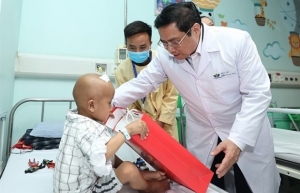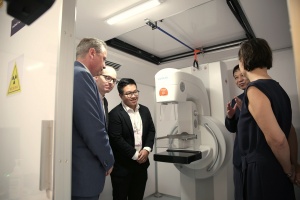Lung cancer screening saves lives in Vietnam and Asia
Among their recommendations, the experts urge a shift from traditionally used chest X-rays to a more advanced procedure known as low-dose computed tomography (LDCT), which uses a computer with low dose X-rays to generate a series of pictures and can help to detect lung abnormalities, including tumours.
A US clinical trial involving over 50,000 participants demonstrated a 20 per cent relative reduction in lung cancer deaths with LDCT screening (247 deaths per 100,000 person-years) compared with chest X-rays (309 deaths per 100,000 person-years), due to better early cancer detection.
 |
These changes will be significant in helping to protect lives in Asia, given that approximately three in five cases of lung cancer occur within the region, representing more than 1.3 million patients. It is estimated that each year, there are over 180,000 new cancer cases in Vietnam alone, among which approximately 26,000 cases are lung cancer.
Prof. Pan-Chyr Yang from the Department of Internal Medicine, College of Medicine, National Taiwan University, said, “The expert consensus calls for urgent changes to initiate LDCT screening programmes for people who could be at risk of lung cancer across Asia. This will result in more sensitive screening across the region, and drive earlier detection of lung cancer, when there is a greater potential for cure.”
According to the consensus, patients with abnormalities detected while undergoing routine health screening, or those with persistent exposure to risk factors, are recommended to be screened with LDCT annually, while high-risk heavy smokers should do so twice a year.
In most parts of Asia, LDCT has yet to be implemented for routine lung cancer screening initiatives due to the perceived cost, reimbursement concerns, lack of infrastructure, untrained staff, patient reluctance, as well as an absence of well-defined guidelines. To overcome these difficulties, the experts recommend improving access to lung screening programmes and subsequent care by having a standardised protocol for follow-up LDCT scans and consideration for integrated lung healthcare, such as a national screening scheme.
The consensus is the result of extensive discussion among experts from Hong Kong, India, Indonesia, Japan, Malaysia, the Philippines, Singapore, South Korea, Taiwan, Thailand, and Vietnam, backed by the Lung Ambition Alliance (LAA).
The LAA is a non-profit collaboration between the International Association for the Study of Lung Cancer (IASLC), the Global Lung Cancer Coalition (GLCC), AstraZeneca, and Guardant Health.
Associate Professor, PhD. Nguyen Viet Nhung, head of the Lung Department, University of Medicine and Pharmacy, Hanoi National University, president of the Vietnam Lung Association, said, “Vietnam and Asia can offer patients highly effective treatment regimens that means with early detection, there is a far-higher chance of cure.”
“In Vietnam, lung cancer screening with LDCT has been recommended by the Ministry of Health since 2018. However, the practice so far is limited. The expert consensus in Asia, once again, is to act more urgently and make LDCT screening the main screening method. Smokers of 20 packs per year or more, or non-smokers with a family history of lung cancer, aged between 50 and 75 years of age, should also be included if we are to save more lives from lung cancer,” he added.
And while smoking is the leading risk factor, lung cancer among never-smokers accounts for a substantial proportion of cases, especially among Asian women. Studies have shown a higher proportion of non-smoking lung cancer patients in Asia, when compared to Europe and North America. In addition, non-smoking lung cancer patients in Asia are more likely to be diagnosed at an earlier age compared with current and former smokers.
There have also been calls to incorporate campaigns designed to encourage smokers to quit alongside lung cancer screening programmes.
Documenting country-specific evidence on risk factors among never-smokers, which include age, family history of lung cancer, history of other cancers, second-hand smoking, and exposure to indoor pollution, such as cooking and heating fumes, and outdoor air pollution, could also help garner government support in establishing a lung cancer screening programme locally.
 | 2,500 children suffer from cancer in Vietnam every year About 2,500 children in Vietnam suffer from cancer every year, said doctor Bui Ngoc Lan. |
 | Mammography truck offers free breast cancer screening in Ho Chi Minh City A free breast screening camp for women is taking place at Deutsches Haus, District 1, Ho Chi Minh City, from January 5 to 11. |
 | K Hospital and Roche Pharma Vietnam co-organise cancer immunotherapy seminar K Hospital, together with Roche Pharma Vietnam, have organised a highly anticipated scientific conference themed Cancer ImmunoTherapy - Light to guide the future in the treatment of lung and liver cancer. |
What the stars mean:
★ Poor ★ ★ Promising ★★★ Good ★★★★ Very good ★★★★★ Exceptional
 Tag:
Tag:
Themes: Healthcare Platform
- Takeda Vietnam awarded for ongoing support of Vietnam’s sustainability efforts
- Self-care signals shift towards sustainable healthcare
- DKSH to acquire Vietnamese healthcare distributor Biomedic
- Two national hospitals expand capacity with new facilities
- Vietnam moves to enhance disease prevention, equity, and sustainability
Related Contents
Latest News
More News
- 72 nations sign landmark Hanoi cybercrime convention (October 26, 2025 | 18:00)
- UN Secretary-General commends Vietnam’s global leadership (October 26, 2025 | 09:00)
- APEC finance ministers convene to tackle regional challenges (October 22, 2025 | 17:31)
- Rewiring global trade: ASEAN’s rise as supply chain hub (October 17, 2025 | 11:40)
- Vietnam attends first World Nuclear Week Forum in Russia (September 26, 2025 | 10:50)
- Vietnam attends 69th session of IAEA General Conference (September 16, 2025 | 10:00)
- ADB, WB pledge over 12 billion USD for ASEAN power grid, renewable energy projects (August 15, 2025 | 14:18)
- Lowy Institute proposes AI-based tobacco control solutions for ASEAN (August 15, 2025 | 14:14)
- Cloud computing policy to position Malaysia as regional hub by 2030 (August 15, 2025 | 14:11)
- Thailand, Cambodia suffer numerous cyber attacks (August 05, 2025 | 16:19)



























 Mobile Version
Mobile Version